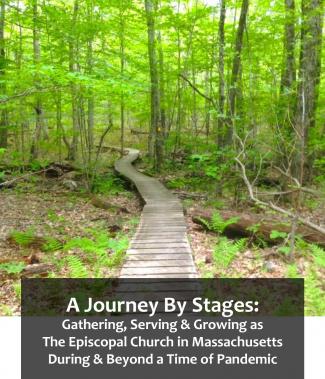The four-phase Massachusetts reopening plan announced by Governor Charlie Baker on May 18 permits restricted regathering at houses of worship right away, but Episcopal churches in Massachusetts will not be resuming in-person public worship or gatherings until at least July 1—a directive issued by the bishops of both Massachusetts Episcopal dioceses earlier this month.
That directive remains in effect until further notice, despite allowances in the governor’s plan, which is focused on balancing the reopening of the state economy with public safety concerns amidst the still-active COVID-19 pandemic.
Several epidemiologists have voiced concern about resumption of in-person worship services now, as more than 1,000 new infections a day are still being reported in Massachusetts.
“While we regret this ongoing necessity, we know it is the safe and loving course of action,” Bishop Alan M. Gates and Bishop Gayle E. Harris of the Diocese of Massachusetts said in a May 12 announcement that their restriction on in-person public worship and gatherings is extended until July 1.
“We are profoundly grateful for the dedication and creativity with which congregations are responding to provide alternative, virtual opportunities for worship and fellowship, as well as continued ministry to the most vulnerable in our communities,” the bishops said, encouraging congregations to continue in their innovative and faithful efforts.
Bishop Douglas J. Fisher of the Diocese of Western Massachusetts issued a similar July 1 restriction to his diocesan community on May 9.
Anticipating that eventual and phased resumption of in-person public worship and church activities will be complicated and require careful preparation, the three bishops of the two Massachusetts Episcopal dioceses have jointly issued a detailed set of guidelines—“A Journey By Stages”—and they are urging congregational leaders to start discussing now what safe regathering will entail in their local contexts.
True to their title, the guidelines characterize regathering during and beyond a time of pandemic as a journey by stages and one that does not proceed in a one-way linear fashion.
They are organized into four stages that include general descriptions of particular phases of the pandemic, along with requirements and practices for church contexts that need to be followed for each phase.
Context matters, the guidelines note, with church life being carried out in a variety of locales and facilities, and in communities affected differently and at different times by COVID-19. “This is not a one-size-fits-all plan for regathering. In each community and congregation we must consider how we protect one another and our neighbors, carry out the mission entrusted to us and offer our prayers and praises to God,” the guidelines say, also noting, “Just because it’s permissible doesn’t mean it will be desirable or sustainable, or that it will feel more like church!”
Online meetings via Zoom have been scheduled the week following Memorial Day for Diocese of Massachusetts clergy, wardens and other congregational leaders, so that they can talk through the guidelines, ask questions and support one another.
In a letter introducing the guidelines, the bishops acknowledge that the complexity of the process for regathering is daunting, but they also sound a note of hope.
“Every congregation has been affected by grief and trauma in this pandemic. Every congregation has also experienced new ways of being Church,” they write. “We have found ‘grace in the wilderness’ (Jeremiah 31:2) at every turn: people who have not been in our buildings for any number of reasons are suddenly a faithful part of our online worship and fellowship; distances have been bridged; new relationships have been formed; commitment to the vulnerable has been renewed. That ‘wonderful and sacred mystery,’ the Church, has indeed seen surprising ways in which ‘things which had grown old are being made new.’ (The Book of Common Prayer, p. 280)
“Being made new, of course, is not the same as ‘returning to normal.’ In fact, we will be called forward to something different—just as Christians have always been.”
--Tracy J. Sukraw
Find the guidelines, "A Journey By Stages," in English here and Spanish here.
All Diocese of Massachusetts COVID-19 updates, bishops' messages and resources are posted here.

